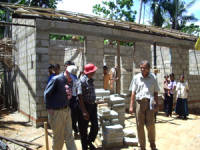Background and Objectives

The primary focus of the project is to support the Government Agents (GAs) and RADA to achieve the completion of a coordinated tsunami housing programme. The project will provide district level technical support to the GAs and support for the development of a National Housing Policy, which will integrate tsunami housing issues. The third year post-tsunami activity will involve the completion of approximately 50,000 houses. This will involve many of the more complex housing issues, including the integration of infrastructure and quality related issues, and specifically, housing solutions in some of the most challenging geographic areas - due to the conflict and extreme land shortage.
Activities
The approach adopted, has been to develop close working relationships with RADA and other key ministries responsible for the provision of tsunami housing, as well as the GAs, other district based staff and all key development partners engaged in funding or the provision of tsunami housing.
* District Housing Profiles were developed by the team and made available in January 2007. These will be developed further and updated as issues occur. These 'Profiles' will bring clarity on four key counts:
* Greater understanding of the volume/number of houses required (a database will be maintained),
* A clear statement of core tsunami housing issues faced by each district (including analysis of co-financing availability),
* A clear analysis of the infrastructure related challenges and
* A clear explanation of emerging quality issues and recommended remedial actions.
Results (2008)
Coordination was always to be a major challenge with the unprecedented response of aid agencies rushing into Sri Lanka. UN-HABITAT immediately advocated for a coherent coordination structure for the rebuilding of houses and communities.
The Post Disaster Housing Coordination Project was established after a considerable delay in raising funds for the project. However the project, in partnership with key government agencies, quickly developed structures to improve coordination in the tsunami-affected areas and in Colombo.
The project produced improved and reliable data on the housing needs and progress being made, and improved communication within implementing agencies and between them and the government agencies.
Development Partners / Partners
Development Partners: UNICEF, UNDP, IFRC
Partners: Reconstruction and Development Authority (RADA), Ministry of Urban Development and Water Supply, Ministry of Housing, District Authorities
- Catalytic Support to Peacebuilding in Sri Lanka
- Preparation of the Resettlement Plan (RP) for Households Affected by the Rehabilitation of the Kelani Valley (KV) Railway Line in Sri Lanka (Phase I)
- Emergency Shelter Relief for Flood and Landslide Affected Households in Kalutara and Galle Districts of Sri Lanka
- The State of Sri Lankan Cities Report
- Human Development Initiative through Empowerment and Settlement Improvement in the Plantation Settlements in Sri Lanka
- Indian Housing Project in Central and Uva Provinces
- Emergency Shelter Relief for Flood Affected Families in Colombo and Gampaha Districts in Western Province, Sri Lanka (Completed)
- Sustainable Resettlement through Community-Driven Improvement of the Learning Environment in Mannar District, Sri Lanka
- Support My School: Supporting Schools in Northern Sri Lanka with Access to Water and Sanitation Facilities (Completed)
- Project for Rehabilitation of Community Infrastructure, Improvement of Livelihoods and Empowerment of Women in the Northern and Eastern Provinces (RCI) (Completed)
- Rainwater Harvesting in a Water Scarce Small Village in Northern Sri Lanka (Completed)
- Climate Resilient Action Plans for Coastal Urban Areas (Completed)
- Disaster Resilient City Development Strategies for Sri Lankan Cities (Completed)
- Disaster Resilient City Development Strategies for Four Cities in the Northern and Eastern Provinces of Sri Lanka (Phase II) (Completed)
- Rehabilitation of Community Infrastructure and Facilities in the Conflict Affected Areas in Northern Province of Sri Lanka (Completed)
- Improving Living Conditions in Returnee Areas of Sri Lanka through Housing (Completed)
- Indian Housing Project (Completed)
- Support to Conflict Affected People through Housing (Completed)
- Shelter Support to Conflict-affected IDPs in the North of Sri Lanka (Completed)
- Jaffna Tsunami Recovery and Reconstruction Project (Completed)
- Community Recovery and Reconstruction Partnership to Support the People's Process of Rebuilding (Completed)
- Reconstruction of Fish Market in Galle (Completed)
- Rebuilding Community Infrastructure and Shelter in Tsunami-Affected Areas (Completed)
- Lunawa Lake Environment Improvement and Community Development Project (Completed)
- Pro-Poor Partnerships for Participatory Settlement Upgrading (Completed)
- Early Recovery Shelter for IDPs in Batticaloa (Completed)
- Support to the Urbanization Framework
- Post Disaster Housing Coordination Project (Completed)
- Sustainable Cities Programme (Completed)
- Urban Governance Support Project (UGSP) (Completed)
- Rebuilding Communities in North East Sri Lanka (Completed)
- Urban Poverty Reduction Strategy - Colombo (Completed)






































